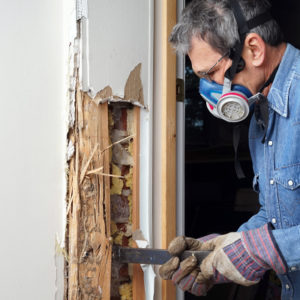 As seasons change, different pests become more prevalent. In warmer months, you may observe more insects outside, while in colder seasons, the risk of rodent infestations increases.
As seasons change, different pests become more prevalent. In warmer months, you may observe more insects outside, while in colder seasons, the risk of rodent infestations increases.
Below, we will explore seasonal pests and share proven tips for managing them. By understanding their behavior, you can act early and prevent costly infestations throughout the year.
Spring
As temperatures rise, most seasonal pests emerge from hibernation and multiply rapidly. Eggs laid in previous months begin to hatch, leading to rapid infestations.
Watch out for:
- Flies: Typically reach full maturity and actively search for food in early spring. Flies travel in sizable groups, making their presence easily noticeable.
- Stink Bugs: These critters avoid damaging plants until late summer but may emerge as soon as the weather warms up. They release a pungent odor when they feel threatened.
- Ticks: Ticks tend to roam in tall grass and shrubbery, potentially carrying bacteria that cause Lyme disease and Rocky Mountain spotted fever. Their bites can result in pus-filled blisters and black scabs.
- Raccoons: They usually reside near water sources, relying on local flora and fauna for sustenance. As spring arrives and water thaws, food sources become more abundant, prompting raccoons to emerge from hibernation and wreak havoc on yards or gardens.
Summer
Summer offers ample heat and humidity for pests to grow and multiply. Insects are ectothermic creatures, meaning they rely on external temperatures to regulate their body heat. Warmer temperatures accelerate their metabolism, leading to increased activity and reproduction.
Summer also offers abundant food in the form of blooming plants, ripening fruits and organic materials that attract pests.
Watch out for:
- Ants: Higher temperatures boost ants’ activity levels and walking speed. In the summer, it’s common to find carpenters, odorous, pavement, red fire and little black ants.
- Cockroaches: In scorching temperatures, cockroaches can enter your property to seek food, water and shelter. Summer is also their breeding season, leading to a significant population surge.
- Stinging Insects: Bees, wasps and hornets mate and construct new nests in the summer. Contact seasonal pest control professionals immediately if you discover a hive on your property. Attempting to handle it yourself can be risky, as these insects often become aggressive when their nests are disturbed.
Autumn
Pests become less active and seek warmer shelter as days shorten and temperatures drop. This seasonal migration often leads to an uptick in indoor pest infestations.
Watch out for:
- Spiders: While spiders can be found in attics, basements and corners throughout the year, they are particularly noticeable in colder months. Spiders mate during the fall and tend to lay as many eggs as they can before they perish. Female spiders can simultaneously lay up to 100 eggs indoors, causing infestations to escalate rapidly.
- Squirrels: Squirrel infestations peak in late autumn as they start storing food. They may leave parks to invade homes and attics to search for nesting spots.
- Ladybugs: Ladybugs are beneficial insects but can be bothersome in the fall. They often come in hundreds, hiding in attics and porches.
Winter
During winter, pests migrate, burrow, hibernate or adapt their lifecycle phases. They frequently invade indoor spaces to nest and seek refuge from the cold.
Watch out for:
- Rodents: Cold temperatures and reduced outdoor food sources drive mice and rats indoors, posing several health risks. They can contaminate food supplies with their droppings and urine, spreading diseases like salmonella and hantavirus. Additionally, their constant gnawing may damage pipes, furniture and electrical wires.
- Bats: Cold weather limits the supply of insects, a primary food source for bats. That’s why they seek refuge in warmer places like attics, sheds, or barns, where they can conserve energy and survive. To identify a bat infestation, look out for small, dark bat droppings (guano) near entry points or on the ground and yellowish urine stains on walls and ceilings. Rustling or scratching sounds in walls, particularly at night, can also signal the presence of bats.
- Fleas: Fleas do not hibernate nor become inactive in the winter. However, freezing temperatures compel them to stay indoors. They latch onto pets and settle on carpets, bedding and furniture. Their bites can cause intense itching and discomfort, leading to skin infections if scratched excessively.
Seasonal Pest Control Tips
When it comes to seasonal pest infestations, prevention is key. Follow these tips to keep unwanted guests out of your property:
- Let the pest control professionals conduct routine checks and treatments, especially at the start of each season.
- Identify and seal possible entry points, such as roof gaps and foundation cracks. Replace worn weather stripping around doors and windows, and promptly repair roof damage.
- Pests are attracted to food remnants, so dispose of garbage regularly and ensure that trash cans have tight-fitting lids.
- During warmer months, trim bushes, trees and shrubs near your property. Overhanging branches and dense vegetation provide convenient pathways for raccoons and squirrels to access your space. Always clear existing debris to discourage nesting sites.
- Store food in airtight containers, preventing access for insects and rodents.
- Eliminate stagnant water sources to deter mosquitoes and other insects.
Prevent Infestations with Seasonal Pest Control Solutions
Don’t wait for seasonal pests to threaten your health and damage your property. By turning to Pest Control Unlimited, you can keep your home or business hygienic and pest-free all year.
Our residential and commercial treatments include one-time and quarterly program visits. We specialize in bed bug spray, mice extermination, tick spray and more. Count on us to tailor an appropriate solution according to your needs and the state of your property.
Contact us today to book an inspection and request a free quote.

